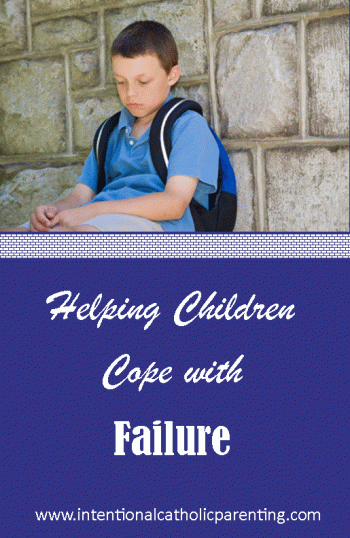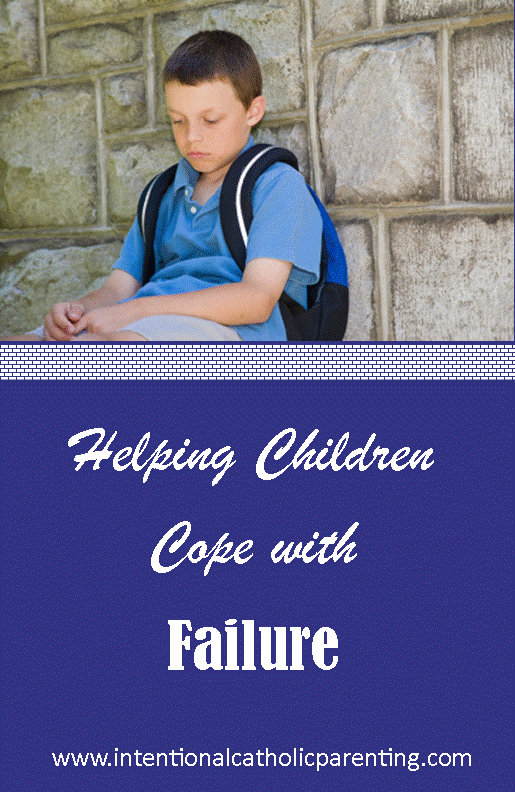Every child faces the disappointment of not doing as well as they hoped on a test or not placing in a competition. Some kids bounce back from these “failures” and even seem to learn something from them, while other kids become so down on themselves that they want to give up. How can help our own kids build resilience in the face of life’s little setbacks?
Here are some resources to help us:
Coping with Failure and Stress by Ray Williams. This article looks at the research on which coping strategies are the most effective for dealing with failure. What’s NOT effective: venting, self-distraction, self-blame, and denial. (I found this interesting as I tend to vent! I’ll remember that next time I experience a failure.) What is MOST effective:
reframing our failures, laughing about them, and accepting the failure rather than denying it. So, we can help our kids reframe their failures by pointing out to them what they did accomplish and what they learned. We can help them not take things too seriously, and, by all means, we can avoid the pitfall of pretending that our child’s failure was somebody else’s fault.
Keeping Failure in Perspective on Aha Parenting. In this list of ways to build your child’s self-esteem, #3 is “empower your child by helping her keep her failures in perspective.” As in the above article, this blogger recommends “reframing”: help your child see that “any given setback is temporary AND she has some control over whether things will work out next time. . . Then, give your child as much support as necessary so that she can be successful — which is very different from doing it for her. Seeing that their actions have a big impact on their success helps kids try harder next time, instead of giving up on themselves.”
I agree: rigging our child’s world so that she never experiences failure is so very tempting! But it will backfire in the long run. I think perspective is important because frequently kids lack perspective on what their failure means. Getting a mediocre grade on a test does not mean their lives are over. Getting 4th place in a gymnastics competition doesn’t mean they are a bad gymnast. And let’s not forget: tests and gymnastics are not as important as the quality of our child’s character and the depth of her faith. We can remind her of that.
Failure IS an Option by Aviva Patz. Failure can actually benefit kids! “Learning to deal with setbacks helps them develop key characteristics they’ll need to succeed, such as coping skills, emotional resilience, creative thinking, and the ability to collaborate.” The author recommends that parents 1) be a guide, not a savior (help him problem solve) 2) don’t over-praise your child and 3) encourage your child to try new things – not just things they’re good at.
Helping Kids Overcome a Fear of Failure by Vicky Zakrzewski is an article written for teachers, but it’s also useful information for parents. When it comes to failure, kids fall into four categories.
- Success-oriented kids “love learning for the sake of learning and see failure as a way to improve their ability rather than a slight on their value as a human being.” This a very healthy response to failure.
- Over-strivers are closet achievers. They “avoid failure by succeeding—but only with herculean effort motivated solely by the fear that even one failure will confirm their greatest fear: that they’re not perfect.” These kids tend to underplay the effort they’re putting into things. They tell their friends they didn’t study for a test or they never practice their instrument even though they prepare and practice a great deal – more than could be reasonably expected.
- Failure-avoiders don’t try to succeed at all. They refuse to participate, make excuses or lie about not doing their homework, or they take on clearly impossible tasks that they will never finish. Deep down they fear they are incapable of doing well so they save face by not doing anything.
- Failure-accepters believe deeply that they are unskilled, dumb, or incompetent. Any failure confirms their belief. Even when they do well, they will tend to attribute their success to somebody else.
Kids in the last two categories will tend to focus on areas they are very good at and avoid anything that is difficult, while success-oriented kids are willing to try things outside their comfort zone. Parents in the last two categories tend to punish their kids for failure while the parents of success-oriented kids tend to praise success but don’t punish failure.
As Catholic parents, let’s remember, too, the grace of failure. When I look back on my own failures, I can see the hand of God at work. Failures help us look at ourselves honestly and help us accept our human limitations. Even when I’ve followed the will of God, I have sometimes failed. This might make me wonder why God would want me to try something if I was going to be hurt in the process. I’ve learned that God calls us to try, not necessarily succeed. But when we have been motivated by love for God and neighbor, we will always learn something from failure – about ourselves, the world, and our relationships.


